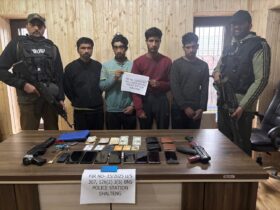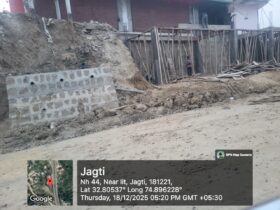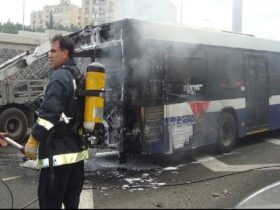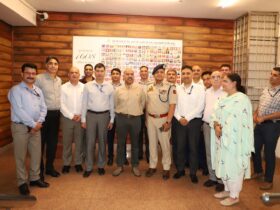ISHFAQ AHMAD
A great autumn wind was whistling outside, groaning and galloping, one of those winds which kill the last leaves and carry them away to the clouds and convey the arrival of the winter. A wind so cold as to tear the flesh like a saw, cut it like a blade of a knife, prick it like a poisoned sting. Alone, the thick ardent girl with her bright black hair and her large black almond eyes marching on the street to reach for her class to pen down the notes. I cast a quick, critical, appreciative glance at her, without uttering a word. I told myself that her tastes in choosing are flawless. Her clear complexion was in perfect harmony with her eyes that looked upon the world with ingenuous calmness. There was something in her that seemed to claim for her a right as a perfect work of nature and be admired equally. I could see her legs shivering, nose red and hands frozen, she was feeling chill to the very marrow. I could look at the white vapor coming from her mouth but she was casual of anything and everything happening around her. Seeing her condition I said to myself that education for girls should be banned, at least in this way.
At the right turn of the lane, the lane that connects her home to her tutor, she abruptly disappeared leaving a sound of bang at the door for me. To satisfy my curiosity of knowing her, I awaited. It was only after two hours that she appeared again. Some sweet and fleeting thoughts singing in her soul this time accompanied by her friends. They were gossiping, whispering and humming to each other. Somehow, I came to know her name when one of her friend called her “Noori”. The row dismantled when they changed their directions towards their homes. I secretly followed Noori almost like her own shadow, suddenly in one of the curves she turned to her left, as I neared her I saw a group of houses from either side of the path. Involuntarily, I stopped in front of the gate of her house, so pretty was it, cemented house with white colored windows guarding it. On the gate, in large letters I read the name of the proprietor.
I asked myself what a fairy inhabited the place. But then same old thoughts conceived in my mind “daughters are viewed as strangers’ wealth, because they are to be given away in marriage at a great expense, maybe she has to handle household chores and undergo a preparation for married life or maybe education is looked as a curse on her in her family. All my doubts rested when I came to know that her parents had quite remarkable observation about her education. Noori had discovered education as a sole source of becoming independent which will contribute a lot to the development of her personality, helping her father to lessen some of the growing problems.
Trust me “she was a Cinderella and independence her prince”. Noori was the only source left after her father to help family monetarily. Besides, her family constituted of her mother Aisha, three younger sisters and a brother. Aisha was a sensible, supportive, and religious woman who had spent major portion of life in visiting Dargah’s, Aastan’s and peer babas, wearing a veil. She used to wake early for Fajr prayers and retire late, besides she used to be on the run all day long. Aisha had one ambition, to see her children escape the cycle of poverty through education. She longed to see Noori working in a company, someday, to wave her while going to office, to prepare her tiffin. Problems were already rampant in her family and their solutions always far. Her father Ramzan was a shawl weaver and ran a good business. The family was not such poor in a manner of being homeless. They were living an average comfortable life. One day a devastating blow came to Ramzan’s business, and over the period of a year the established business dropped out of sight, besides, now no real assistance was expected from Ramzan, as his health was bad and he was also losing his eye sight .Gone Were Those days when if a Kashmiri woman had to wish her neighbor she would say “May you get a Shawl weaver as husband”.
The money stopped coming in but Ramzan was mentally and morally supported by his wife and Noori. It was the time Noori had completed her graduation as well as diploma in computers, but before the idea of further study would have entered her mind she began to feel guilty that she was not contributing with any kind of income, perhaps the time had come to pull her socks up, to shoulder the responsibility of her family. She had never worked outside the home and was not compromising with the fact; needless to say she was scared but still had faith that everything would be all right. She felt a little free and more alive as her other friends, perhaps she had this feeling that, after all, Kashmir was home to brave and legendary women like Lal-ded and Habba Khatun who had led phenomenal lives, leaving husbands and homes to wander about, singing songs of devotion and divine love.
She reacted very fiercely to any queries related to love and romance, well how could she even dare to think of these things when her helpless family was the only true concern. She began hunting for job but found none. At that time her mother became more ill than she had been and ended up in the hospital for a month, this added more to Noori’s worries. Everything had to be taken care of by Noori both in the hospital as well as in home. She was a courageous girl but the growing crisis had sapped her inwardly. She did shopping, household chores, and did other things that her mother was not able to do anymore. Besides, she was job hunting. Sometimes her uncles would pay and sometimes her mother’s savings helped them but she still needed another source of income. One of the first applications she had filled out finally came through. She passed the interview with flying colors and she thought it to be exactly what she wanted, although it was only a part time, but more importantly she could be at home giving herself to other activities. She had murdered her own desires and aspiration.
It was not a big deal for her to work in such a religious atmosphere because it had become common for girls to work for very low wages not enough for their bus fare despite of their immense qualification. The other problems that they frequently face is molestation, pushing and groping in buses and lewd remarks on road, mental trauma, fear psychosis, BSF chaps always prying around, which is expected of a city where bunkers are ubiquitous. The bag of tragedy was not yet empty for her. Within three weeks, when she had not even received her first salary instead received a phone call from her office that she is no more needed for the job. Noori was devastated. Her fate betrayed her again. The only thing she could have done in this grave situation was crying. She began to cry, softly at first just from the sheer pain of being rejected then the thought came to her mind as to what would happen to her helpless family she cried harder and yelled and collapsed on the floor. There was no one to pick her up, to feel her agony, to share her grief accept herself. She became angry at everything that got her there. She faced towards the sky and asked Allah “what do you want me to do”? She felt as if Allah had abandoned her.
After confronting all this I was not able to breath and thought to cry. That night I didn’t feel to eat and wanted to narrate this story to my mother but I was taken aback. When I retired to bed, I placed my head upon pillow started thinking about Noori and her desperate plight, somehow through the aid of capital conscience, I fell into a profound slumber but when were the hopes of humanity fulfilled? I could not have completed my third breathe when there came a furious ring at the phone, which awoke me at once, I picked up the hand-set and heard my friend at the other end of the line, neighbor of Noori . The news he gave struck me that I was as wide awake as a scientist, I wept profusely, overthrowing all in my way, dressed in rapidity and set off at the top of my speed to see the unfortunate corpse of the girl, committed suicide—the girl was Noori—she had died painlessly and tranquilly, like a women whose life was blameless, and now she lay on her back in bed, with closed eyes, calm features, her long black hair carefully arranged, as if she had combed ten minutes before her journey (to death), while looking at her one feels sure that a sweet soul had dwelt in that body, who had spent a troubled existence. At her head near the pillow was her mother, while on her knees her father and her sisters were weeping distractedly. Why? Now, she is no more going to work, she is not going to be waived by Aisha, she can never be happy or sad. What about the degrees and certificates that she bagged after painful struggle, perspiring hard work and horrendous life. So, has Allah really abandoned her? “She must have died but I see so many Noori’s around, so many Noori’s to follow, so many Noori’s I am fearfully waiting to end their life
The Author can be mailed at ishi.sai@gmail.com
THE GIRL NEXT DOOR
BY
ISHFAQ AHMAD
A great autumn wind was whistling outside, groaning and galloping, one of those winds which kill the last leaves and carry them away to the clouds and convey the arrival of the winter. A wind so cold as to tear the flesh like a saw, cut it like a blade of a knife, prick it like a poisoned sting. Alone, the thick ardent girl with her bright black hair and her large black almond eyes marching on the street to reach for her class to pen down the notes. I cast a quick, critical, appreciative glance at her, without uttering a word. I told myself that her tastes in choosing are flawless. Her clear complexion was in perfect harmony with her eyes that looked upon the world with ingenuous calmness. There was something in her that seemed to claim for her a right as a perfect work of nature and be admired equally. I could see her legs shivering, nose red and hands frozen, she was feeling chill to the very marrow. I could look at the white vapor coming from her mouth but she was casual of anything and everything happening around her. Seeing her condition I said to myself that education for girls should be banned, at least in this way.
At the right turn of the lane, the lane that connects her home to her tutor, she abruptly disappeared leaving a sound of bang at the door for me. To satisfy my curiosity of knowing her, I awaited. It was only after two hours that she appeared again. Some sweet and fleeting thoughts singing in her soul this time accompanied by her friends. They were gossiping, whispering and humming to each other. Somehow, I came to know her name when one of her friend called her “Noori”. The row dismantled when they changed their directions towards their homes. I secretly followed Noori almost like her own shadow, suddenly in one of the curves she turned to her left, as I neared her I saw a group of houses from either side of the path. Involuntarily, I stopped in front of the gate of her house, so pretty was it, cemented house with white colored windows guarding it. On the gate, in large letters I read the name of the proprietor.
I asked myself what a fairy inhabited the place. But then same old thoughts conceived in my mind “daughters are viewed as strangers’ wealth, because they are to be given away in marriage at a great expense, maybe she has to handle household chores and undergo a preparation for married life or maybe education is looked as a curse on her in her family. All my doubts rested when I came to know that her parents had quite remarkable observation about her education. Noori had discovered education as a sole source of becoming independent which will contribute a lot to the development of her personality, helping her father to lessen some of the growing problems. Trust me “she was a Cinderella and independence her prince”. Noori was the only source left after her father to help family monetarily. Besides, her family constituted of her mother Aisha, three younger sisters and a brother. Aisha was a sensible, supportive, and religious woman who had spent major portion of life in visiting Dargah’s, Aastan’s and peer babas, wearing a veil. She used to wake early for Fajr prayers and retire late, besides she used to be on the run all day long. Aisha had one ambition, to see her children escape the cycle of poverty through education. She longed to see Noori working in a company, someday, to wave her while going to office, to prepare her tiffin. Problems were already rampant in her family and their solutions always far. Her father Ramzan was a shawl weaver and ran a good business. The family was not such poor in a manner of being homeless. They were living an average comfortable life. One day a devastating blow came to Ramzan’s business, and over the period of a year the established business dropped out of sight, besides, now no real assistance was expected from Ramzan, as his health was bad and he was also losing his eye sight .Gone Were Those days when if a Kashmiri woman had to wish her neighbor she would say “May you get a Shawl weaver as husband”.
The money stopped coming in but Ramzan was mentally and morally supported by his wife and Noori. It was the time Noori had completed her graduation as well as diploma in computers, but before the idea of further study would have entered her mind she began to feel guilty that she was not contributing with any kind of income, perhaps the time had come to pull her socks up, to shoulder the responsibility of her family. She had never worked outside the home and was not compromising with the fact; needless to say she was scared but still had faith that everything would be all right. She felt a little free and more alive as her other friends, perhaps she had this feeling that, after all, Kashmir was home to brave and legendary women like Lal-ded and Habba Khatun who had led phenomenal lives, leaving husbands and homes to wander about, singing songs of devotion and divine love.
She reacted very fiercely to any queries related to love and romance, well how could she even dare to think of these things when her helpless family was the only true concern. She began hunting for job but found none. At that time her mother became more ill than she had been and ended up in the hospital for a month, this added more to Noori’s worries. Everything had to be taken care of by Noori both in the hospital as well as in home. She was a courageous girl but the growing crisis had sapped her inwardly. She did shopping, household chores, and did other things that her mother was not able to do anymore. Besides, she was job hunting. Sometimes her uncles would pay and sometimes her mother’s savings helped them but she still needed another source of income. One of the first applications she had filled out finally came through. She passed the interview with flying colors and she thought it to be exactly what she wanted, although it was only a part time, but more importantly she could be at home giving herself to other activities. She had murdered her own desires and aspiration.
It was not a big deal for her to work in such a religious atmosphere because it had become common for girls to work for very low wages not enough for their bus fare despite of their immense qualification. The other problems that they frequently face is molestation, pushing and groping in buses and lewd remarks on road, mental trauma, fear psychosis, BSF chaps always prying around, which is expected of a city where bunkers are ubiquitous. The bag of tragedy was not yet empty for her. Within three weeks, when she had not even received her first salary instead received a phone call from her office that she is no more needed for the job. Noori was devastated. Her fate betrayed her again. The only thing she could have done in this grave situation was crying. She began to cry, softly at first just from the sheer pain of being rejected then the thought came to her mind as to what would happen to her helpless family she cried harder and yelled and collapsed on the floor. There was no one to pick her up, to feel her agony, to share her grief accept herself. She became angry at everything that got her there. She faced towards the sky and asked Allah “what do you want me to do”? She felt as if Allah had abandoned her.
After confronting all this I was not able to breath and thought to cry. That night I didn’t feel to eat and wanted to narrate this story to my mother but I was taken aback. When I retired to bed, I placed my head upon pillow started thinking about Noori and her desperate plight, somehow through the aid of capital conscience, I fell into a profound slumber but when were the hopes of humanity fulfilled? I could not have completed my third breathe when there came a furious ring at the phone, which awoke me at once, I picked up the hand-set and heard my friend at the other end of the line, neighbor of Noori . The news he gave struck me that I was as wide awake as a scientist, I wept profusely, overthrowing all in my way, dressed in rapidity and set off at the top of my speed to see the unfortunate corpse of the girl, committed suicide—the girl was Noori—she had died painlessly and tranquilly, like a women whose life was blameless, and now she lay on her back in bed, with closed eyes, calm features, her long black hair carefully arranged, as if she had combed ten minutes before her journey (to death), while looking at her one feels sure that a sweet soul had dwelt in that body, who had spent a troubled existence. At her head near the pillow was her mother, while on her knees her father and her sisters were weeping distractedly. Why? Now, she is no more going to work, she is not going to be waived by Aisha, she can never be happy or sad. What about the degrees and certificates that she bagged after painful struggle, perspiring hard work and horrendous life. So, has Allah really abandoned her? “She must have died but I see so many Noori’s around, so many Noori’s to follow, so many Noori’s I am fearfully waiting to end their life
The Author can be mailed at ishi.sai@gmail.com

















Leave a Reply